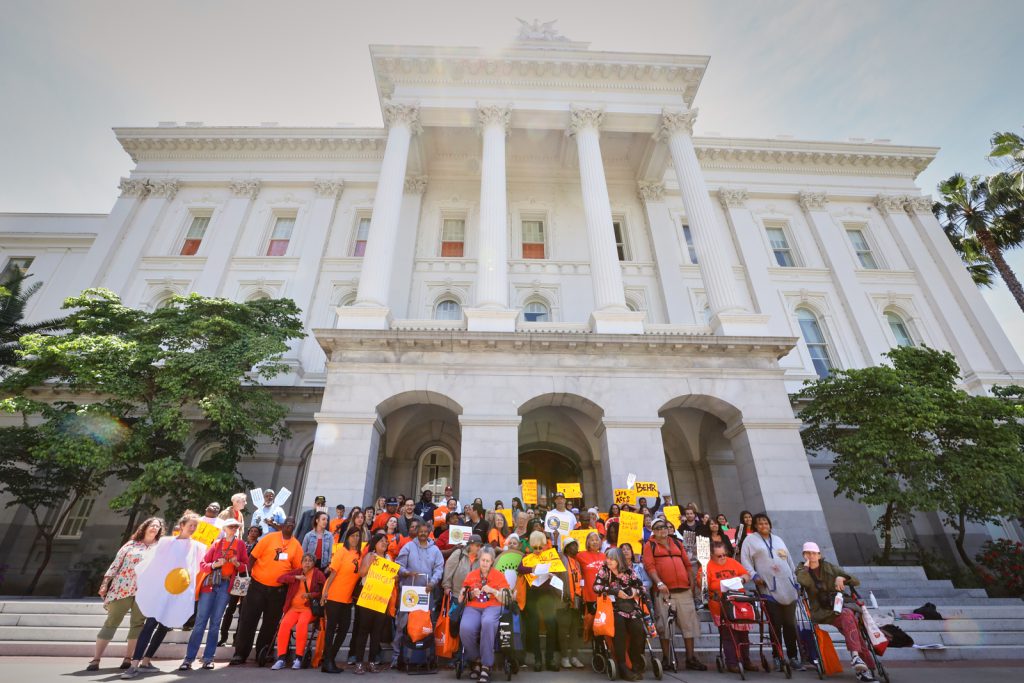Hunger Action Day 2019: Food is a Fundamental Human Right
July 3, 2019
We do not offer food. Here’s where you can find food.
No distribuimos alimentos. Encuentre comida gratis aquí.
我們不直接提供食物,但我們能幫助您找尋食物。

This year on Hunger Action Day at California’s State Capitol, CAFB joined hundreds of advocates as part of the California Hunger Action Coalition (CHAC), a state-based coalition focused on defending and improving the social safety net, to advocate for food as a fundamental human right.
Though California is home to immense wealth, the reality is that many still struggle to afford the basic necessities of living: food, medicine, housing, and so much more.
Assemblymember Eloise Gómez Reyes spoke to her successful efforts to end the SSI cash-out policy that prevented SSI recipients from receiving CalFresh benefits to supplement their food and nutrition access.
Kim McCoy Wade, longtime food access activist, elucidated the importance of ensuring food access for all people, including seniors, children, and people that have historically been marginalized and excluded from accessing public benefits, such as those with felony convictions on their records.
State Senator Scott Weiner commented that no one should be living in abject poverty and struggling to put food on the table in California, the fifth largest economy in the world. Further, Senator Weiner stressed his commitment to improving the CalFresh participation rate to ensure people can access the food and nutrition benefits they need.
Jessica Bartholow, policy advocate with the Western Center on Law & Poverty, emphasized that we must move beyond saying “we shouldn’t have hunger for people working full-time” and move toward embracing a human rights framework for anti-hunger advocacy. We shouldn’t have hunger for anyone, under any circumstance.
Bartholow spoke of her personal experience with hunger as a child and postulated that, contrary to the regressive argument that hunger and malnutrition incentivize work, no one makes themselves more productive or more employable by going hungry. Further, she encouraged Hunger Action Day participants to present their elected representatives with the truth about hunger, to lead with their stories, and to build a movement by having fun and making friends.
Shanti Prasad, senior policy advocate at the Alameda County Community Food Bank, gave an overview of anti-hunger budgetary and legislative priorities. She also reiterated Bartholow’s point that anti-hunger advocates shouldn’t get bogged down by policy wonkiness, as the most effective testimonies draw from personal experience.
Prasad spoke to the urgency of demanding an increase in California SSI grants; California’s state portion of the SSI grant, the resource that 1.2 million Californians rely on, was cut to its bare minimum during the recession. As a result, people on SSI are living on less than 90% of the federal poverty level in California.
Prasad also referenced one recent victory in the anti-hunger movement: people on SSI are now eligible to apply for CalFresh. She commented that the end of the SSI cash-out policy is a great step, but medicine, rent, and other basic necessities can’t get paid by CalFresh. In order to advance an inclusive anti-hunger agenda, all the basic necessities of life must be accounted for, not seen as a zero-sum game.
To conclude the rally, community members from across the state expressed first-hand stories of hunger, suffering, and marginalization, demanding their elected representatives listen and take note. Whether discussing hunger, illness, poverty, or other misfortunes, the speakers insisted that the anti-hunger movement center the voices and perspectives of those who have personally experienced food insecurity.
Together, by maintaining an on-the-ground perspective, building strong communities and networks, and defending social safety nets, we can end hunger in California.